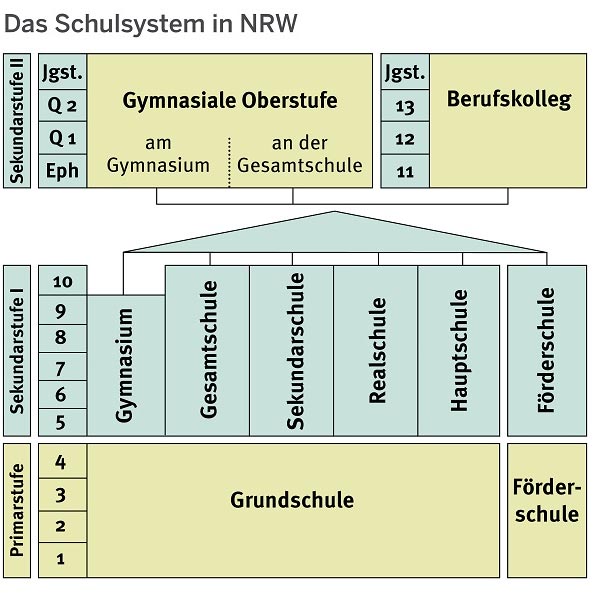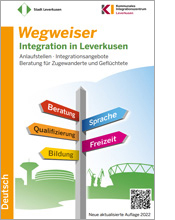Day care
Day care services are often the first point of access to the education system. Children come into contact with others of the same age, play together and are encouraged. This also fosters early language acquisition and competence. This is especially important for when children move on to school.
In Leverkusen, there are various childcare services for children aged 0–6 years. As there is great demand for childcare places, interested parents should register their child early on for a spot in the facility of their choice via the “Kita-Planer” or with the facility itself:
Further information and links on day care in Leverkusen can be found on the website of the City of Leverkusen (Stadt Leverkusen):
School enrolment for new immigrants and refugees of school age
In Leverkusen, children and young people of school age who have recently arrived in Germany are assigned to a school by the Kommunales Integrationszentrum (municipal integration centre). The enrolment is coordinated in cooperation with the “lower” school inspectorate/Generale Migration. Regardless of their country of origin and residence status, schoolage children and young people who have recently immigrated to Germany are advised on the school system and given a school place. Appointments for this must be arranged by phone.
Only by prior arrangement with the following contacts:
For children aged 6–10 (Primarstufe/primary school):
Bernd Häck
Phone: 0214 / 406-5226
E-Mail:
Mon: 9:00 – 16:00 o`clock
Wed: 9:00 – 16:30 o`clock
Thurs: 11:00 – 16:00 o`clock
For children aged 11-14 (Sekundarstufe II/secondary school):
Antje-Lena Fricke
Phone: 0214 / 406-5223
E-Mail:
Mon - Fri: 9:30 - 14:30 o`clock
For young people aged 15–18 (Sekundarstufe II/upper secondary school):
Bernd Häck
Phone: 0214 / 406-5226
E-Mail:
Mon: 9:00 – 16:00 o`clock
Wed: 9:00 – 16:30 o`clock
Thurs: 11:00 – 16:00 o`clock
Stadt Leverkusen
Kommunales Integrationszentrum
Hauptstraße 105
51373 Leverkusen
At Grundschule level, newly immigrated children in Leverkusen largely go straight into regular classes. At Sekundarstufe I level, lessons are initially given in international preparatory classes (IVK) or German language support groups (DFG). At Berufskolleg (vocational college) level, newly immigrated children of school age join a Fit für mehr (Fit for more) class and/or are taught in an international support class (IFK).
In Leverkusen, there are a total of 17 German language support groups at various schools at Sekundarstufe I level, which includes the following forms of schools: Hauptschule (general secondary school), Realschule (secondary modern school), Gymnasium (grammar school), Gesamtschule (integrated comprehensive school) and Sekundarschule (secondary school). At Sekundarstufe II level, newly immigrated young people and young adults are taught at a Berufskolleg (vocational college) in a total of five international support classes. A Fit für mehr (Fit for more) group is offered. (Last updated: November 2020)
General information on the structure of the school system in North Rhine-Westphalia:

Further information on schools can be found on the website of the NRW Ministry of Schools:
Flyer "The school system in North Rhine-Westphalia" in several languages:
Information on schools in Leverkusen is available at:
www.leverkusen.de/kultur-bildung/schule
Support for language training in day care and school settings
Consistent language support is available for children and young people as part of routine language training integrated into day care and school lessons. Many schools and day cares also offer additional language support. These might be, for example, the Griffbereit and Rucksack programmes or even volunteer-based support for students. The respective day care or school can provide information on whether and which additional language support services are available.
Griffbereit
The Griffbereit programme is aimed at families with children aged up to three years, whether or not from a migrant background. The two-hour group Griffbereit sessions with a parent coach take place once a week. The aim of these groups is to foster children’s language and general development through play.
Bildungspatinnen und Bildungspaten (Education sponsors)
Volunteer education sponsors (Bildungspatinnen und Bildungspaten) provide support to primary school children from immigrant families up to twice a week. Further information (in german) on these education sponsors is available in the “Kommunales Integrationszentrum (municipal integration centre) of the City of Leverkusen” section at
https://integration-in-leverkusen.de/index.php/de/freizeit-familie-und-ehrenamt/ehrenamt
Contact: Antje-Lena Fricke, 0214 / 406 5223,
Language of origin lessons (HSU)
Language of origin lessons (HSU) give students the opportunity to develop or improve their skills in their family language or language of origin.
A wide range of languages are offered at different locations.
If you have questions on HSU, please contact:
Stadt Leverkusen
Fachbereich Schulen
Frau Claudia Wrase
Phone: 0214/ 406-4094
Recognition of foreign school qualifications
School qualifications obtained abroad can be recognised in Germany under certain conditions. You can find information on the procedure for recognising foreign certificates and the relevant responsibilities on the website of the Ministry of Schools and Education of the state of North Rhine-Westphalia:
www.schulministerium.nrw/
The district government of Cologne is responsible for the recognition of qualifications up to the intermediate school certificate (Fachoberschulreife), i.e. first school certificate (formerly Hauptschulabschluss after grade 9), extended first school certificate (formerly Hauptschulabschluss after grade 10) and intermediate school certificate (Fachoberschulreife). Further information can be found here:
www.bezreg-koeln.nrw.de
Recognition of the Fachhochschulreife and Allgemeine Hochschulreife ((Fach-) Abitur) is carried out by the Certificate Recognition Office of the Düsseldorf District Government (Department 48). Further information can be found here:
Anerkennung ausländischer Bildungsnachweise | Bezirksregierung Düsseldorf (nrw.de)




